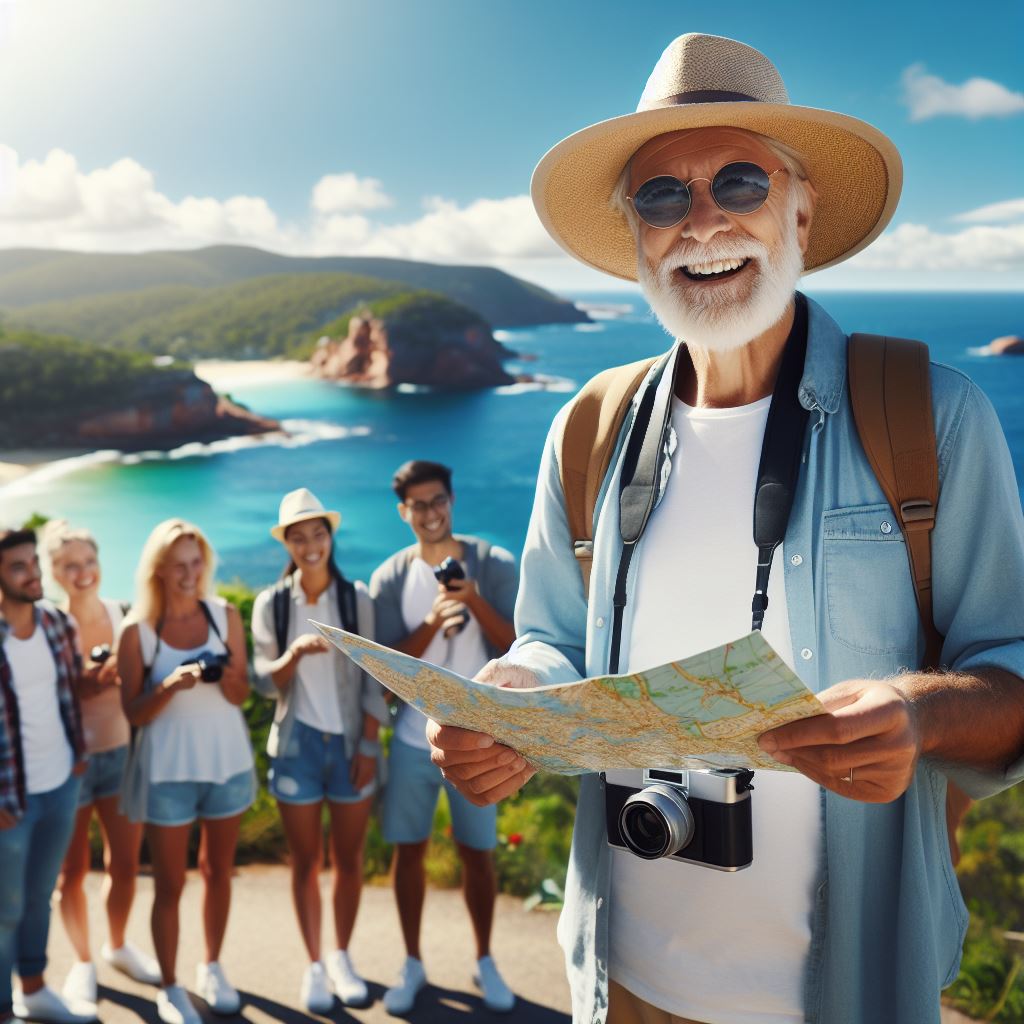Introduction
Handling Difficult Tourists: Dealing with challenging visitors can be a demanding aspect of being a tourism professional.
Importance of handling difficult tourists: Maintaining a positive reputation and ensuring customer satisfaction.
Preview of key points: Techniques for effective communication, conflict management, and maintaining professionalism.
Handling difficult tourists can be a challenging task for tourism professionals.
The ability to effectively handle such situations is essential in ensuring a positive experience for both the visitor and the destination.
It is important for tourism professionals to handle difficult tourists because it directly impacts the reputation of the destination.
Negative reviews and experiences can discourage potential visitors from coming.
Additionally, when handled correctly, difficult situations can be turned around, creating positive word-of-mouth and enhancing customer satisfaction.
This blog post will discuss key strategies for handling difficult tourists.
Firstly, effective communication is crucial.
Tourism professionals should actively listen, display empathy, and provide clear information to address issues and concerns.
By doing so, conflicts can be resolved and tourists can feel heard and understood.
Conflict management skills are also vital.
Staying calm, maintaining a respectful tone, and finding common ground can help diffuse tense situations.
It is essential to find mutually acceptable solutions to ensure a satisfactory outcome for both parties involved.
Lastly, professionalism plays a significant role in handling difficult tourists.
Tourism professionals should remain composed, refrain from taking things personally, and avoid escalating the situation.
By maintaining a professional demeanor, they uphold the integrity of their profession and contribute positively to the overall tourism experience.
In general, handling difficult tourists is a crucial aspect of being a tourism professional.
Through effective communication, conflict management, and professionalism, tourism professionals can turn challenging situations into opportunities for customer satisfaction and an enhanced destination reputation.
Understanding Difficult Tourists
Definition and Characteristics of Difficult Tourists
- Difficult tourists refer to individuals who exhibit challenging behavior during their travel experience.
- They may display rudeness, impatience, entitlement, or unreasonable demands towards tourism professionals.
- Difficult tourists can make interactions stressful, affecting the overall experience for both tourists and tourism workers.
- Their behavior often disrupts the harmony of the travel environment and impacts the quality of service provided.
Common Reasons why Tourists may Become Difficult
Cultural Differences
- Lack of understanding or appreciation for local customs and traditions.
- Communication barriers due to language differences.
Unrealistic Expectations
- Misunderstanding of what can be realistically provided or achieved during their trip.
- Influenced by exaggerated advertising or inaccurate information.
Personal Discomfort
- Physical discomfort due to unfamiliar climates, food, or accommodations.
- Jet lag, fatigue, or illness negatively impacting mood and behavior.
Stress and Pressure
- High expectations to tick off multiple attractions on a limited schedule.
- Pressure from work, financial concerns, or personal issues affecting behavior.
Effects of Difficult Tourists on the Tourism Industry
Negative Reviews and Reputation
- Difficult tourists spreading negative experiences through reviews can deter potential visitors.
- Online platforms make it easier for unfavorable opinions to reach a wider audience.
Decreased Employee Morale
- Continuous exposure to difficult tourists can affect employees’ job satisfaction.
- Dealing with challenging behavior may lead to burnout or high turnover rates.
Lost Revenue
- Dissatisfied tourists are less likely to spend money on additional services or products.
- Negative word-of-mouth can result in a decline in tourist arrivals, hurting the local economy.
Strained Relationships
- Difficult tourists create tension between tourism professionals and tourists, affecting future interactions.
- This strain impacts the overall tourism experience and can lead to a decline in tourism.
In fact, understanding difficult tourists is crucial in effectively managing their impact on the tourism industry. Difficult tourists can possess certain characteristics and exhibit challenging behavior due to various reasons.
Recognizing their behavior’s negative effects, such as negative reviews, decreased employee morale, lost revenue, and strained relationships, highlights the importance of addressing this issue.
By acknowledging the reasons behind difficult behavior and implementing strategies to handle such tourists, tourism professionals can ensure a more pleasant experience for all parties involved.
Read: The Rise of Female Chefs in Australia’s Kitchens
Communication Strategies for Dealing with Difficult Tourists
Importance of effective communication
- Clear communication is crucial in handling difficult tourists to avoid misunderstandings and conflicts.
- It helps build trust and rapport, making it easier to resolve issues effectively.
- Effective communication ensures that tourists feel heard and understood, increasing their satisfaction.
Active listening techniques
- Listen attentively to the tourist’s concerns without interrupting or judging.
- Show genuine interest by maintaining eye contact and nodding to indicate understanding.
- Paraphrase and summarize their concerns to ensure you have correctly understood them.
- Ask open-ended questions to encourage the tourist to express their thoughts and feelings.
Empathy and understanding
- Put yourself in the tourist’s shoes to better understand their perspective and emotions.
- Express empathy by acknowledging their frustration and offering reassurance that you will assist them.
- Acknowledge any mistakes or inconveniences caused, taking responsibility for resolving the issue.
- Show understanding by being patient, even if the tourist becomes agitated or difficult.
Non-verbal communication cues
- Pay attention to your body language, as it can convey a lot about your intentions and emotions.
- Maintain an open posture, with relaxed shoulders and arms, to appear approachable and non-threatening.
- Use facial expressions to show interest, concern, and empathy.
- Use appropriate hand gestures to enhance your verbal communication and convey meanings.
- Be mindful of personal space and respect the tourist’s boundaries.
- Smile genuinely to create a positive and welcoming atmosphere.
Effective communication strategies play a vital role in handling difficult tourists.
By prioritizing clear and active listening, showing empathy, and utilizing non-verbal communication cues, tour guides can enhance their ability to resolve conflicts and ensure customer satisfaction.
Remember, the way you communicate can make a significant difference in turning a challenging situation into a positive experience for both the tourist and yourself.
Read: Eco-Friendly Travel: Agents Leading the Way
Conflict Resolution Techniques
Conflict resolution is an essential skill to handle difficult tourists effectively. Whether it’s a communication breakdown or a disagreement over travel arrangements, conflicts can arise while dealing with tourists.
This section explores various conflict resolution techniques to help tour guides navigate through challenging situations and provide a positive experience for all parties involved.
Identifying the cause of conflict
The first step in resolving conflicts is identifying the underlying cause or issue. Effective communication and active listening play a crucial role in understanding the concerns or grievances of the tourists.
By pinpointing the cause, the tour guide can address the root of the problem and work towards a solution.
Remaining calm and composed during conflict situations
Remaining calm in the face of conflict is crucial for productive communication. It is essential for tour guides to control their emotions and not let frustration or anger affect their responses.
By staying composed, they can approach the conflict with a clear mind and find a resolution based on rational thinking.
Finding common ground and mutual solutions
Successful conflict resolution often involves finding common ground between the tour guide and the difficult tourist. By acknowledging and understanding both perspectives, it becomes easier to find mutually beneficial solutions.
This approach fosters a sense of collaboration and cooperation, allowing both parties to feel heard and respected.
Managing emotions and stress during conflicts
Conflicts may provoke strong emotions and stress, making it difficult to find a resolution. Tour guides should practice self-awareness and develop techniques to manage their emotions and stress effectively.
Taking deep breaths, counting to ten, and maintaining a positive mindset can help tour guides handle conflicts in a composed manner.
By implementing these conflict resolution techniques, tour guides can handle difficult tourists more effectively and maintain a positive and professional demeanor.
It is essential to remember that conflicts are an inevitable part of the job, and the way they are handled can greatly impact the overall experience for tourists.
In a nutshell, conflict resolution techniques are indispensable skills for tour guides when dealing with difficult tourists.
By identifying the cause of conflict, remaining calm and composed, finding common ground, and managing emotions and stress, tour guides can navigate through conflicts successfully.
These techniques not only help resolve conflicts but also foster a positive and enjoyable experience for all tourists involved.
Read: Salary Guide: Travel Agents in Australia

Cultural Sensitivity and Adaptability
Understanding cultural differences and their impact on behavior
- It is crucial for guides to have a deep understanding of cultural differences in order to handle difficult tourists effectively.
- Different cultures have distinct behaviors and customs that can impact the way tourists interact with their surroundings.
- Understanding cultural differences helps in comprehending the motivations and expectations of tourists.
- Guides should be aware of cultural nuances to avoid misunderstandings and prevent difficult situations from arising.
- By recognizing cultural differences, guides can adapt their approach and provide a more positive experience for tourists.
Respecting cultural norms and customs
- Showing respect for cultural norms and customs is essential for maintaining a harmonious environment during tours.
- Guides should familiarize themselves with the customs and norms of the destination to avoid offending tourists.
- Respecting cultural norms demonstrates professionalism and helps build a rapport with tourists.
- Inappropriate behavior can create tension and discomfort among tourists, leading to difficult situations.
- Guides should be mindful of gestures, clothing, and behavior that might be considered disrespectful in the local culture.
Adapting communication and service approaches accordingly
- Effective communication is key when dealing with difficult tourists from different cultural backgrounds.
- Guides should make an effort to adapt their communication style to match the cultural norms and preferences of tourists.
- Adapted communication includes using appropriate language, avoiding slang, and being mindful of non-verbal cues.
- Tailoring service approaches is crucial to meet the specific needs and expectations of tourists from different cultures.
- By being adaptable, guides can create a more comfortable and enjoyable experience for difficult tourists, enhancing their satisfaction.
In essence, cultural sensitivity and adaptability play a vital role in handling difficult tourists effectively. Understanding cultural differences and their impact on behavior helps guides navigate challenging situations.
Respecting cultural norms and customs maintains a harmonious atmosphere during tours. Adapting communication and service approaches ensures effective interaction with tourists from diverse backgrounds.
Ultimately, by embracing cultural sensitivity and adaptability, guides can provide a memorable and rewarding experience for both themselves and their tourists.
Read: Travel Agents: The Future in Aussie Tourism
Your Personalized Career Strategy
Unlock your potential with tailored career consulting. Get clear, actionable steps designed for your success. Start now!
Get StartedManaging Unrealistic Expectations
Setting realistic expectations at the beginning
- Communicate clearly with tourists about what they can expect from the tour.
- Highlight any limitations, restrictions, or challenges that may arise during the trip.
- Manage their expectations by explaining potential delays or changes in the itinerary.
- Provide detailed information about the tour, including duration, activities, and accommodations.
Educating tourists about limitations and restrictions
- Inform tourists about any cultural or religious customs they should be aware of.
- Explain the importance of respecting local traditions, rules, and regulations.
- Educate tourists about environmental concerns and the need for sustainable practices.
- Make them aware of any safety precautions they need to follow during the tour.
Offering alternative solutions or experiences
- Be prepared with backup plans in case of unexpected circumstances or changes.
- Provide options for alternative activities or attractions if the original plans are not feasible.
- Offer suggestions for unique and off-the-beaten-path experiences that may exceed their expectations.
- Be flexible and open to accommodating individual preferences or special requests.
Balancing customer satisfaction and service standards
- Strive to meet or exceed customer expectations while maintaining service quality.
- Listen to tourists’ feedback and address their concerns promptly and professionally.
- Train tour guides to handle difficult situations and find appropriate solutions.
- Continuously improve service standards based on feedback and market trends.
In review, managing unrealistic expectations from tourists requires proactive measures to set the right expectations, educate them about limitations, offer alternative solutions, and maintain a balance between customer satisfaction and service standards.
By effectively managing these challenges, tour guides can enhance the overall tourist experience and build a positive reputation for their tours.
Gain More Insights: Networking Tips for Aussie Event Professionals
Find Out More: Eco-Friendly Practices in Hotel Management
Dealing with Aggressive or Unreasonable Tourists
Ensuring personal safety and seeking assistance if needed
- Stay alert and aware of your surroundings at all times.
- If you feel threatened, trust your instincts and remove yourself from the situation.
- Do not hesitate to seek help from fellow guides, security personnel, or local authorities.
- Remember, your safety is of utmost importance.
Staying calm and professional during confrontations
- Keep your emotions in check and remain composed.
- Listen attentively to the tourist’s concerns, even if they are expressing them aggressively.
- Respond in a polite and respectful manner, focusing on finding a solution.
- Avoid escalating the situation by arguing or becoming defensive.
Following organizational guidelines and protocols
- Familiarize yourself with the rules and policies set by your organization for handling difficult tourists.
- Adhere to these guidelines while addressing challenging situations.
- Seek guidance from your superior or team leaders if you are unsure about the appropriate course of action.
- Remember, your organization’s reputation is at stake.
Reporting incidents and documenting necessary information
- Take detailed notes of any incidents involving aggressive or unreasonable tourists.
- Include relevant information such as the date, time, location, and a description of the incident.
- Record the names and contact details of any witnesses who can provide further insight.
- Report the incident to your supervisor or the designated authority within your organization.
Dealing with aggressive or unreasonable tourists can be challenging, but by following these guidelines, you can effectively manage difficult situations while maintaining your professionalism.
Your personal safety should always be prioritized, so trust your instincts and seek assistance if needed. Stay calm and composed, actively listen to the tourists’ concerns, and respond with respect and politeness.
Make sure you are aware of your organization’s guidelines and protocols, following them diligently to uphold your company’s reputation.
Lastly, document incidents thoroughly, including all necessary information, and report them promptly to the appropriate authorities. By handling difficult tourists adeptly, you can ensure a positive experience for both yourself and other visitors.
See Related Content: Salary Guide: Event Coordinators in Australia
Learn More: Wine Knowledge for Bartenders in Australia
Self-care and Well-being for Tourism Professionals
Recognizing the emotional challenges of dealing with difficult tourists
- Understand that dealing with difficult tourists can be emotionally draining and challenging.
- Recognize the impact that difficult tourists may have on your mental and emotional well-being.
- Acknowledge that it is normal to feel frustrated, stressed, or even angry when facing difficult tourists.
- Be aware of the potential long-term effects of constantly dealing with difficult tourists, such as burnout or compassion fatigue.
Practicing self-care and stress management techniques
- Prioritize self-care activities to maintain your physical and mental well-being.
- Establish a healthy work-life balance to avoid excessive stress and exhaustion.
- Engage in regular exercise and maintain a nutritious diet to support your overall well-being.
- Develop relaxation techniques such as deep breathing exercises, mindfulness, or meditation to reduce stress.
- Take regular breaks during work hours and utilize time off to recharge and rejuvenate.
- Find hobbies or activities outside of work that bring joy and relaxation to your life.
Seeking support from colleagues and supervisors
- Create a supportive network by fostering relationships with colleagues and supervisors.
- Share your experiences and challenges with trusted colleagues who can provide understanding and guidance.
- Seek professional advice or guidance from supervisors or mentors on how to handle difficult tourists.
- Participate in team-building activities to enhance cooperation and support within the workplace.
- Consider joining professional networks or associations related to tourism to connect with peers facing similar challenges.
- Attend workshops or training programs to improve your skills in dealing with difficult tourists.
Remember, taking care of yourself is crucial for delivering excellent service to tourists.
By recognizing the emotional challenges, practicing self-care, and seeking support, you can ensure your well-being and maintain professionalism in handling difficult tourists.
List of self-care and stress management techniques
- Regular exercise
- Maintain a healthy diet
- Engage in relaxation techniques (deep breathing, mindfulness, meditation)
- Prioritize work-life balance
- Take breaks and utilize time off
- Find hobbies or activities outside of work
- Foster supportive relationships with colleagues
- Seek professional advice and guidance from supervisors or mentors
- Participate in team-building activities
- Join professional networks or associations
- Attend workshops or training programs.
Uncover the Details: Cocktail Recipes: Aussie Bartenders’ Favorites
Conclusion
Throughout this insightful blog post, we navigated the intricacies of handling difficult tourists, emphasizing the proactive strategies essential for tourism professionals.
From effective communication to cultural sensitivity, we delved into the nuanced approaches that can transform challenging encounters into opportunities for positive engagement.
To tourism professionals facing the challenges of managing difficult tourists, I extend a rallying call.
Embrace the tested strategies discussed here, hone your interpersonal skills, and approach each encounter with resilience and adaptability.
By viewing challenges as opportunities for growth, you can not only deftly navigate difficult situations but also elevate the overall experience for both tourists and industry stakeholders.
In the grand tapestry of the tourism industry, the effective management of difficult tourists emerges as a linchpin for sustained success.
Beyond the immediate resolution of conflicts, it shapes the narrative of a destination, influencing the perceptions of future visitors.
The significance of adeptly handling challenging situations transcends individual encounters; it resonates in the broader reputation and success of the tourism sector.
As professionals, your commitment to mastering the art of handling difficult tourists is an investment not only in your personal growth but in the flourishing future of the entire tourism industry.
In closing, let these insights be a compass guiding tourism professionals through the intricate terrain of challenging encounters.
By employing proactive strategies, embracing resilience, and recognizing the profound impact of your role, you contribute not only to the immediate resolution of issues but also to the enduring prosperity of the tourism industry at large.




